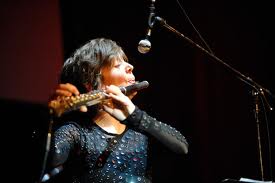The new list of MacArthur fellows, just released, features not one musician from the world of jazz among the 23 distinguished Americans who will receive $100,000 a year for five years.
Two musicians are named among the fellows: Claire Chase, flutist and founder of the International Contemporary Ensemble (ICE)
and Chris Thile, mandolinist of Nickle Creek and the Punch Brothers. I congratulate them both, as well as the other honored writers, artists, scientists, and a historian, economist, social services innovator. But considering the MacArthur program, established  since  in 1981 has included jazz-related musicians frequently since 1988 (starting with Ran Blake and Max Roach, continuing with George Russell, Ali Akbar Khan, Gunther Schuller, Cecil Taylor, Steve Lacy, Anthony Braxton, Ornette Coleman, Ken Vandermark, George E. Lewis, Edgar Meyer — with whom Chris Thile has collaborated — Reginald Robinson, Regina Carter, John Zorn, Corey Harris, Miguel Zenon, Jason Moran and Dafnis Prieto), and that the fellowships are not for past works but rather investments in the artists and hence their art forms’ futures, the absence this year is disappointing.

